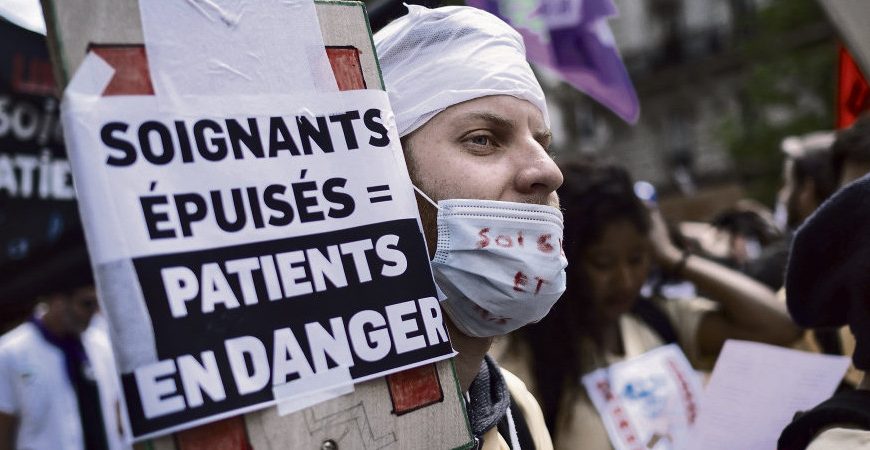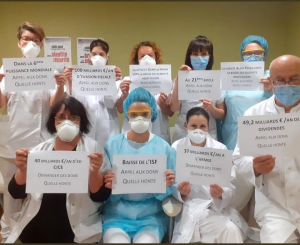IN HIS SPEECH OF MARCH 12, EMMANUEL MACRON PRAISED THE STAFF OF PUBLIC HOSPITALS, DOCTORS, NURSES, PARAMEDICS AND A&E STAFF FOR THEIR COMMITMENT, THEIR DEDICATION AND THEIR EFFICIENCY. THEY HAD ALL ANSWERED THE CALL, AND IN SO DOING, THEY HAD DELAYED THE SPREAD OF THE VIRUS AND LIMITED THE SEVERE CASES.
Indeed, it is them, the personnel employed in the health services, who wage the superhuman fight to maintain life at all costs, every day, in the face of the meteoric development of the epidemic, and without the means to fight the virus effectively. It is them too who went on strike for months against the degradation of their working conditions and to show that the public services, and the hospitals in particular, could no longer cope, following the drastic cuts in financial and human resources that the successive governments had imposed over the years.
Emmanuel Macron also said: “… What this pandemic shows is that in our Welfare State, health care [for all] regardless of income, history or profession are not costs or charges. These are precious assets which must be placed beyond the laws of the market. Deep down, it is madness to contract out to others the care of our food, our protection, our ability to heal and our living environment. We must regain control of it all. We must build even more than we do, a sovereign France and Europe, a France and a Europe which hold their destiny firmly in hand. The coming weeks and months are going to need ground-breaking decisions in this area. I will assume them …”
Do not read in these words that this government’s aim are going to change radically, or that the public hospital is going to finally receive the funding that it needs; or that our social security system will stay untouched by the reforms, like the pensions system, now put on hold for the time being. For more than twenty years now, liberal policies have contributed to destroying the capacity of our public services. Austerity measures and unpopular reforms against workers and pensioners have been pushed through, while the wealthy and the private businesses have been favoured, deepening the social inequalities. To verify this in the current chaos, enough to see the de-structuring of the health services and the shortages there – the lack of masks, screening tests, reanimation respirators, beds, equipment and personnel. This starvation of resources is replicated at the level of medical research where, to find funding, the researchers must present projects or call for donations in this sector so vital to public health.
Health Workers in France
The way this coronavirus pandemic strikes ruthlessly in every country demonstrates the scale of the breakdown and incapacity of this [social] system to confront the situation: the cruel lack of anticipation, the evolution and geographical expansion of the virus and the absence of a public health plan to counter it. As the French government announces new measures every day, and places orders for masks and screening tests that take time to arrive, it is like piloting by sight.
In his speech, E. Macron never once mentioned the need for containment to prevent the virus from spreading. He even showed himself lounging leisurely outside. The education minister said on the same day that there was no reason to close the schools. Insufficiently aware of the danger, people lowered their guard and took advantage of a sunny weekend to stroll about and picnic in the parks. The following Sunday, the polling stations opened for the first round of the municipal elections, showing at first sight a certain normalcy. The next day, the announcement for general confinement descended, with a moralising speech from the government relayed by the media, against these people who continue to live normally, supposedly unconscious, unruly, individualistic, not in solidarity.
But whose fault? Our rulers told us everything and its opposite: “Stay at home” was hammered at all hours ‘to avoid spreading the contagion’ but also with the advice to “go to work” if you cannot work from home (without any protection) – whilst factories and companies were closing one after the other or announcing lay-offs. Incentives were created to induce people to go to work, like the tax-free bonuses! [1] Stuck in their consumerist and productivist logic, it took time for our rulers to realise that economic activity had to stop if lives were going to be saved.
As of March 16, Emmanuel Macron donned his warlord costume. He then appeared on television to pronounce repeatedly: “We are at war”- and to call for national unity to give himself full powers. In a few days flat, he got the Health Emergency Law [2] passed on March 23, which institutes a kind of intermediate between a State of Emergency and the Emergency Regime. With much hammering of orders and decrees to restrict circulation and freedoms without any control from parliament – itself also confined. And without any means to assess the merits of these measures from the constitutional point of view. Even if the situation demanded drastic measures, one can legitimately wonder about their duration, particularly in light of the experience France made after the terrorist attacks when the temporary State of Emergency became perennial!
The Health Emergency Law represents therefore one more attack on freedom and democracy. Its implementation is accompanied by drones and helicopters to check that the population stays really confined at home, duly supplied with mandatory exemption certificates under the threat of fines and 6 months in jail. All this in a context where the virus threat has now reached the prisons. There, overcrowding and the promiscuity of prisoners has led to talk of the need to release some of them. Police and gendarmerie are mobilised to maintain the order of confinement and punish offenders. Hundreds of thousands of penalty tickets have already been issued across the country.
The 43 Ordinances of this Health Law themselves carry the economic and social measures of a very great retreat in the working conditions. Up to now, no-one ever dared to go this far, not even during the hectic reforms of the Code of Labour (2016). According to the three Covid-19 Ordinances on Working Time, employers can derogate from the legal rules. They can require employees to take 6 days of their paid holidays at any time, change or decide the dates of the employee’s statutory paid holidays, split them up, revoke the existing working hours arrangements, and the rest days. It is now possible for the employers to increase the hours of the working day in the sectors deemed “essential to the safeguard of economic life” and “to the security of the Nation”. The working day will pass from 10h to 12 (day or night), and the working week from 48h to 60. These measures are to kick-in on 31 December 2020 — well beyond the confinement period projected for the time being! No more concerted actions, no more social dialogue, no more collective bargaining. And above all for the employers, a lid lifted on the restriction called “respect for the workers’ rights”.
But these employees essential to economic life are also those who earn the least and get the harshest jobs: garbage collectors, cleaning women, nurses, cashiers, carers in retirement homes … It is them who get in the face the full force of the social inequalities. Once the crisis abates, it is them too who will shoulder the costs of what the government hands over to ailing enterprises and part-frozen shareholders’ dividends. Do not look for equitable distribution and social justice at the end of the confinement. Be in no doubt that austerity will still be there. Proof is the call for donations launched by several foundations to help the public hospital and its carers, the latter strongly protesting on account that the public hospital should be in receipt of specific funding, as is done to business. At the Mulhouse hospital, very hard hit by the virus, Emmanuel Macron announced “the coming of a massive investment and upgrading plan for all working careers”. But the Senate contradicts this because, if ongoing bargaining is anything to go by, this privatises the public health services more than it strengthens them.
Hospital personnel repudiate their pay and conditions in a 21st Century France deemed to be the 6th economic power in the world. What a shame! they say. March 2020




















